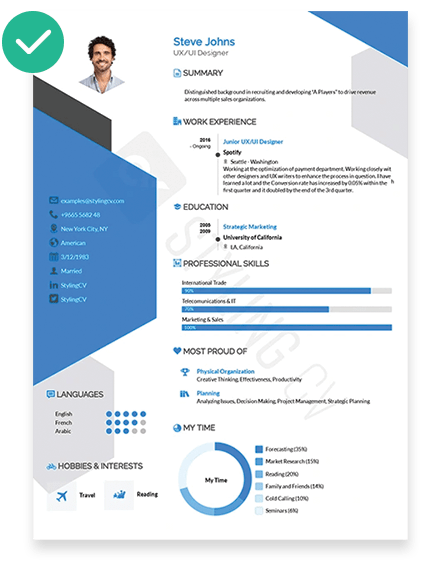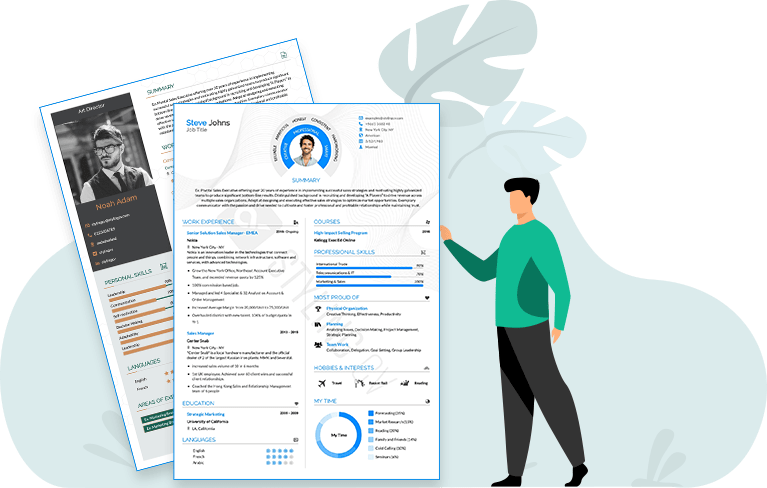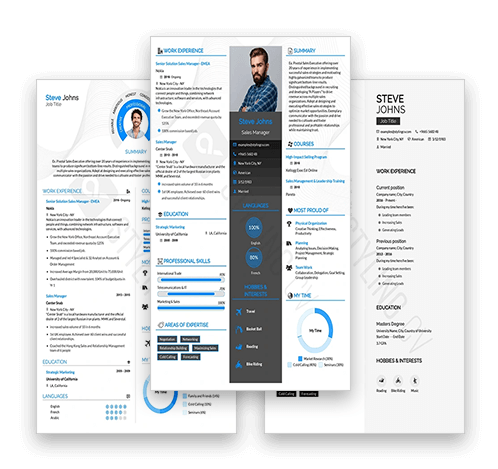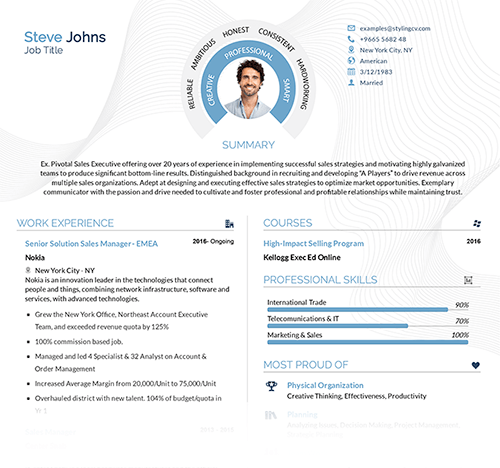To be most effective, your resume should be optimized with applicable keywords and action verbs. Resume keywords are typically nouns that reflect skills and experience sought by a potential employer. If your resume has been selected and ranked by a computer, it will then be reviewed by a human screener; hence, it is important to balance keyword elements with traditional action verbs and other key phrases that elicit a positive response from the hiring manager.
Sarah Reynolds
Content Specialist
I’m Sarah Reynolds, a Content Specialist at StylingCV, where I help professionals tell their stories with clarity and confidence.My focus is on creating content that bridges the gap between job seekers and hiring managers — offering actionable advice on resume writing, interview preparation, and personal branding. I’m passionate about turning career challenges into clear, strategic steps that lead to meaningful opportunities.At StylingCV, I work with an incredible team to deliver resources that empower people to present their best selves — both on paper and in person.Let’s connect if you’re passionate about career growth, creative communication, or making resumes that truly stand out.
Sources & References
- ✓ Career development best practices from leading HR associations
- ✓ Industry research and surveys
- ✓ Expert interviews and case studies
- ✓ Verified by professional career advisors
Last updated: November 29, 2025
Action verbs for resumes & Best resume keywords
To be most effective, your resume should be optimized with applicable keywords and action verbs. Resume keywords are typically nouns that reflect skills and experience sought by a potential employer. If your resume has been selected and ranked by a computer, it will then be reviewed by a human screener; hence, it is important to balance keyword elements with traditional action verbs and other key phrases that elicit a positive response from the hiring manager.
Sarah Reynolds
Content Specialist


We have the perfect action verbs for resumes for you, no matter what responsibility or accomplishment you want to highlight. Take a look at the list below, and get ready to spice up your resume.
In this article, you will learn about:
- What are the keywords in your resume? (Verbs & Words).
- Examples of the most important keywords you can use in your resume.
- The most important frequently asked questions on this topic.
What are action verbs for resumes and how can you use them on your resume?
Verbs of action describe actions, such as “She walked to the door” or “The dog chased the ball”.
Action verbs on your resume demonstrate to readers that you actually accomplished something at previous positions, not merely that you were “responsible for” it.
As an alternative, you “streamlined,” “coordinated,” or “performed” it. You completed the task and made progress in the process.
However, not all action verbs are as powerful as others, so use caution.
For instance, using the phrases “lead” or “handled” sparingly on a resume won’t tell the reader how you accomplished the task.
Did you take charge through delegating tasks to a team, laying out a plan for a task, setting up deadlines and resources, or a mix of the three?
Read more: How To Write a Resume
Resume keywords
How do you know which resume keywords to include? Start by reviewing the job descriptions you’re applying to and take note of the terms that routinely pop up on these job listings.
Now ask yourself these questions:
- How do they define the position and its responsibilities?
- What specific language do they use to state the core requirements for the role?
- Do I have these same skills and experience with the responsibilities?
Read more: Writing a Resume without Work Experience
Resume action verbs
Some of the best words to use in a resume aren’t just keywords related to skills and responsibilities, but actions you have mastered from your previous experience. These are known as action verbs. Here are some of the best words you can include in your resume, most of which are action verbs:
- Achieved
- Improved
- Trained/mentored
- Managed
- Created
- Resolved
- Volunteered
- Influenced
- Increased/decreased
- Ideas
- Negotiated
- Launched
- Revenue/profits
- Under budget
- Won
You can sign up to our site and access many tools, templates, and other important things for building CVs.
Why Are Resume Templates In MS Word BAD?

- It is a very old fashioned way to write a professional resume and takes along time to create.
- Anytime you need to update your resume it’s template breaks and you have to redo it all over again.
- Whenever you want to change the template you’ll spend hours just trying to figure what section goes where.

Additionally, here are the worst words to use in your resume and job application due to their overuse and lack of showing versus telling:
- Track record
- Team player
- Best of breed
- Go-getter
- Synergy
- Go-to person
- Thought leadership
- Value-add
- Results-driven
- Bottom-line
- Hard worker
- Strategic thinker
- Dynamic
- Self-motivated
- Detail-oriented
- Proactively
FAQ about “Action verbs for resumes”
1-What are good action verbs for a resume?
Achieved, Advanced, Analyzed, Appointed, Approved, Assigned, Attained, Authorized, Chaired, Considered, Consolidated, Contracted, Controlled, Converted, Decided, Delegated, Developed, Directed, Eliminated, Emphasized, Enforced, Enhanced, Established, Executed, Generated, Handled, Headed,…
2-What are power words in a resume?
Power words for resumes are words or phrases that make a job seeker stand out from the competition. They are frequently powerful action words that represent duties and responsibilities carried out in previous employment.
3-What words should not be used in a resume?
10 phrases that make a resume look bad
“Negotiable salary” They are aware. “References accessible upon request.”
“Experience working in _____” and “Responsible for ” “Problem-solving abilities” … “Detail-oriented” … “Hardworking” ‘Team player’.
Styling CV is one of the leading CV builders and all the details on this topic, offering great tools and articles on CV topics.

For more comprehensive information on resume writing and job search in Saudi Arabia:
- Top 10 In-Demand Jobs in Saudi Arabia for 2025
- How to Write a Winning Resume for Saudi Arabia in 2025
- How to Get a Job in Saudi Arabia as a Foreigner
Frequently Asked Questions
Sarah Reynolds
Content Specialist
I’m Sarah Reynolds, a Content Specialist at StylingCV, where I help professionals tell their stories with clarity and confidence.My focus is on creating content that bridges the gap between job seekers and hiring managers — offering actionable advice on resume writing, interview preparation, and personal branding. I’m passionate about turning career challenges into clear, strategic steps that lead to meaningful opportunities.At StylingCV, I work with an incredible team to deliver resources that empower people to present their best selves — both on paper and in person.Let’s connect if you’re passionate about career growth, creative communication, or making resumes that truly stand out.
Sources & References
- ✓ Career development best practices from leading HR associations
- ✓ Industry research and surveys
- ✓ Expert interviews and case studies
- ✓ Verified by professional career advisors
Last updated: November 29, 2025
Related Posts
Tags
⚡ Create Your Resume in Just 5 Minutes
Templates designed by hiring experts. No design skills needed.
 Building Your Resume Now
⭐ 4.8/5 Rating
Building Your Resume Now
⭐ 4.8/5 Rating
3,000+ Success Stories


